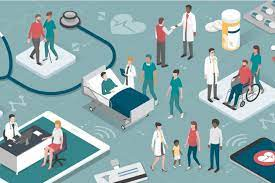
In the face of a growing opioid epidemic, MAT (medication-assisted treatment) clinics have become increasingly important in assisting addicts in recovery. The role of MAT clinics has been debated for years. Some have argued that these clinics are ineffective, while others believe they are essential to addressing the opioid epidemic.
In this article, we will explore what MAT clinic is, as well as its role in helping people overcome addiction to opioids.
Understanding the Opioid Epidemic and Its Impact on Communities
Opioids are a class of drugs that include prescription pain relievers, heroin, and synthetic opioids, such as fentanyl. Opioids are extremely addictive and can cause overdose and death. In the U.S., opioids kill more than 115 people every day.
In 2017, there were nearly 72,000 drug overdoses in the U.S., with 48,000 cases involving an opioid. The majority of these deaths involved a prescription opioid like oxycodone or hydrocodone.
However, illicit opioids, including heroin, were involved in about 15,000 overdose deaths, and synthetic opioids were involved in another 6,000 deaths.
Many communities throughout the United States feel the impact of this epidemic, not just those struggling with addiction but also their family members trying to find ways to help them recover from addiction without resorting to incarceration or death.
The Role of Medication-Assisted Treatment in Addiction Recovery
Medication-assisted treatment (MAT) is a form of addiction recovery that the Food and Drug Administration has approved. It involves taking medication in a doctor’s office that helps to reduce cravings and withdrawal symptoms while helping you maintain a healthier lifestyle.
Medication-assisted treatment combines psychotherapy and pharmaceuticals that help recovering addicts overcome their addictions.
It has been proven to be extremely effective in helping people recover from opioid addiction, but it is not a quick fix. Medication-assisted treatment is a long-term commitment, taking time to see results.
The benefits of MAT are many: it can help patients live independently, reduce the chances of relapse and long-term complications, and improve quality of life.
However, MAT is not suitable for everyone. MAT requires ongoing monitoring by a doctor and caregivers who support patients throughout their recovery.
How MAT Clinics Offer a Comprehensive Approach to Opioid Addiction Treatment
If you’re looking for a way to treat your opioid addiction, MAT clinics offer a comprehensive approach to help you overcome your disorder and get back on your feet.
MAT stands for Medication Assisted Treatment. It’s a type of therapy that uses medications like buprenorphine or methadone to reduce opioid cravings and withdrawal symptoms, as well as manage other co-occurring issues like depression and anxiety.
In addition to medication, MAT clinics also offer counseling and other therapies like group or individual counseling sessions with trained therapists.
These services help patients address the underlying causes of their opioid addiction so that they can live drug-free lives.
Collaborating with Healthcare Providers for Better Patient Outcomes
Collaborating with healthcare providers for better patient outcomes is necessary to succeed in the medical industry. The medical community is not one to be trifled with, and you must understand how they work.
But don’t just take our word for it. Look at the numbers. According to a recent study conducted by the American Medical Association, 88% of doctors surveyed said that collaborating with others helps them improve the quality of care they deliver to patients.
As technology becomes more and more prevalent in healthcare, it’s important to remember that the most important aspect of patient care is the relationship between patients and their providers.
Addressing Common Misconceptions About Medication-Assisted Treatment
There are a lot of misconceptions about medication-assisted treatment, or MAT. Here are the three most common ones and why they’re wrong:
1. It’s only for people who have been addicted for a long time.
MAT isn’t just for longtime addicts. It can also be used for people who have recently started using opioids or have never used opioids before but have been diagnosed with opioid use disorder (OUD). MAT can help prevent overdoses if used early on in an addiction.
2. It’s too expensive to treat with medication-assisted treatment.
Many people think that MAT costs too much money, but studies show that when you look at the number of people it helps get into treatment and stay there, it saves money in the long run. The cost of treating OUDs without medication is much higher than treating them with MAT.
3. You need to take pills every day forever if you want them to work right away.
This isn’t true at all! You might need to take pills every day until your body gets used to them (and maybe less often), but there’s no reason why you would have to take them indefinitely. Most people who start MAT end up being able to stop taking their medication within a few months.
The Vital Role of MAT Clinics in Addressing the Opioid Epidemic: A Comprehensive Approach to Treatment
In conclusion, the opioid epidemic continues to impact communities across the United States, leading to thousands of deaths each year. MAT clinics, like Confidant Health, play a vital role in addressing this crisis, offering a comprehensive approach to opioid addiction treatment that includes medication, counseling, and other therapies. Confidant Health is an online licensed and expert provider of MAT that is discreet and confidential, so you won’t have to worry about anything.
While there are common misconceptions about MAT, studies have shown that it is an effective and cost-saving treatment option that can improve the quality of life for those struggling with opioid addiction. Collaborating with healthcare providers is also crucial in achieving better patient outcomes and addressing this ongoing public health issue.





